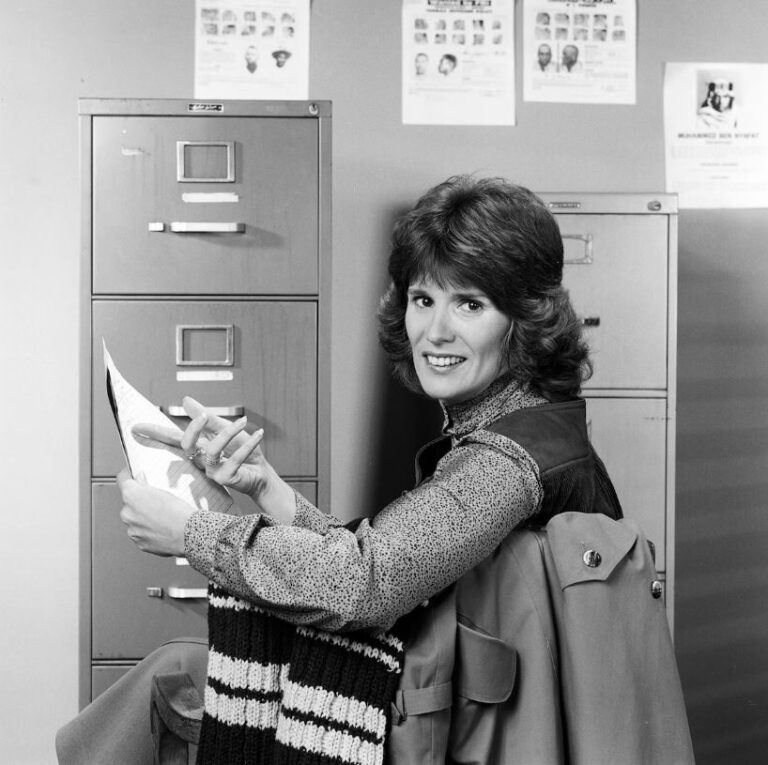Barbara Bosson, an actress best known for portraying a single mother on the popular police procedural drama series “Hill Street Blues,” died on February 18 at 83 in a hospital in Santa Monica, California. Jesse Bochco, her son, confirmed her death but did not explain.
Ms. Bosson’s ex-husband Steven Bochco created the groundbreaking TV show, which has been credited with transforming the genre of police dramas through camera work and well-rounded characters who were neither perfect protagonists nor one-dimensional villains – a trait embodied by Fay Furillo, Barbara’s recurring role.
When NBC’s premiere episode initially aired, Fay Bosson made a solid first impression as she faced her ex-partner, Captain Frank Furillo (Daniel J. Travanti), for failing to pay child support.

Steven Bochco had no idea of including Fay in the show at first, but because of the positive response from viewers, she swiftly became a vital part of it.
She was nominated for five Emmy Awards for her outstanding supporting role as a lady determined to help crime victims and willing to speak her views.
Her language was frequently interrupted by catchphrases like “Hey, buster,” which endeared her to fans.
Stacey Bosson was a beloved character to many ladies who saw her on Hill Street Blues as Fay Furillo. Ms. Bosson became a source of strength and hope for her fans through her portrayal of the character, who was frequently challenged with tragedy.
They related to her challenges whenever they wrote to her, knowing that if Fay could persist, so could they. As a result, she thought she represented everyone who rarely saw themselves correctly portrayed on television.
Nevertheless, Steve Bochco and Michael Kozoll quit the show after the fourth and second seasons due to disagreements over plots and budgets.
Ms. Bosson then opted to leave the program at the end of its fifth season, believing that the writers were erasing some of her character’s intricacies.
She confessed that she could relate to some parts of Fay, such as being outspoken when something irritates her. Still, she felt that Fay was too often portrayed as an everlasting victim with little remedy or potential for growth.
On her show “Hill Street Blues,” Barbara Bosson was an outspoken supporter of portraying realistic characters. She researched the function of a victim advocate and campaigned hard for it to be incorporated into one of the characters.
After a year of persuading, her husband, Steven Bochco, relented, and Fay Furillo became the television equivalent of a victims’ advocate.

The show’s mystery backdrop, which Steven Bochco has described as a hybrid of Chicago, Pittsburgh, New York, and Newark, captured a devoted fan base. Sgt. Phil Esterhaus’ daily morning briefings also included the immortal phrase “Be careful out there!” which became commonplace for years after.
“Hill Street Blues” had a lasting influence on subsequent television dramas; it pioneered interwoven plotlines and building complex personal characters. This legacy can still be seen in shows like NBC’s “St. Elsewhere,” “ER,” and Steven Bochco’s creation “NYPD Blue.”
Barbara Ann Bosson was born in 1939 on 1st of November, in Charleroi, Pennsylvania, and lived in Belle Vernon before her family relocated to Gulfport, Florida, during high school.
Identifying an early interest in the performing arts, she relocated to New York, where she worked as a television production assistant and hostess at the Playboy Club while studying acting.
Although being accepted into Carnegie Tech’s (now Carnegie Mellon University’s) theater department, money concerns prevented her from attending until 1965, when she entered as a 26-year-old freshman. During this time, Barbara met Steven Bochco, whom she married in 1969.
She also befriended budding actors Bruce Weitz and Charles Haid, who subsequently appeared in “Hill Street Blues” with her. On a summer break from college, Barbara joined The Committee, a San Francisco-based improv group, eventually leading to her dropping out of college owing to ongoing performing opportunities.
Ms. Bosson went on to star in several crime shows, including “Hooperman” (1987-1989), “Cop Rock” (1990), and “Murder One” (1995-1997), with “Hooperman” earning her an Emmy nomination for Best Supporting Actress in a Drama Series.
Marlene Bosson made her film début as a nurse in the crime thriller “Bullitt” (1968), starring Steve McQueen.
She later appeared in films such as the 1974 remake of “Mame,” the Broadway musical starring Lucille Ball, and the conspiracy thriller “Capricorn One” (1977).
Ms. Bosson was incredibly proud of her “Hill Street Blues” character’s ability to connect with viewers. In an interview from 1983, she recounted receiving two types of fan mail: those who expressed contempt for her role, most likely due to personal associations, and those who voiced thankfulness for finally seeing their hardships reflected on television.




